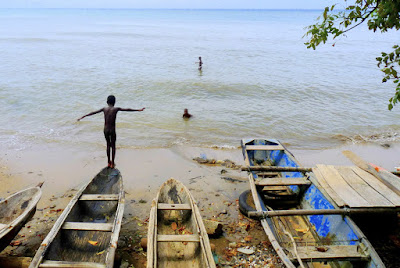
As for the kids there, the only thing they aren't is rich. They're smart, hardworking, well mannered, aggressively learning and pursuing skills. They and their families are practical, gracious, and hospitable. But they're not rich. It's not for lack of effort or work ethic, but because like most such countries, poverty was done to them. They didn't choose to be on the list of the world's fifty poorest countries.
Poverty arrived during the colonial years as land was claimed by wealthy foreigners. Exploitation and slavery dictated the culture that shaped the country. Today, wealth still flows to foreign accounts as resources are extracted, the classic postcolonial flail so many countries experience (ownership/theft of resources, indigenous disenfranchisement, etc.).
 |
| The dugouts are quite old but still in use for fishing; ocean fishing. |
So these precious children, what prospects might they have?
 Their country has one library, one high school, one almost grocery store .... and no online shopping yet; they're too far off the beaten path for Amazon shipping to reach. That doesn't matter much since the median household income is perhaps $120 a month. Internet access is still rare, of course. Not every house has electricity, not every family has floors to walk on, and not every child can afford the small school fees.
Their country has one library, one high school, one almost grocery store .... and no online shopping yet; they're too far off the beaten path for Amazon shipping to reach. That doesn't matter much since the median household income is perhaps $120 a month. Internet access is still rare, of course. Not every house has electricity, not every family has floors to walk on, and not every child can afford the small school fees.The country is changing; government and the economy are developing slowly, and they're being helped a little by the international community. Roads are being repaired after decades of neglect. They have a new power plant, several agricultural projects, and a new middle school. We've helped them build their Coast Guard and begin to manage their territorial waters. Change takes time, and changing a country takes generations.
Meanwhile, their children are just like ours, their moms and dads are just like us, and they could use some help today, particularly at the fringes. In order to make the difference needed at the individual level, help needs to be personal, loving, and a mutual effort, not a program.
Working with local development organizations (reputable, accountable NGOs) is perhaps best for the small scale addressing of needs. Local team members can work with individual families, tutors for kids, perhaps a little health and wellness training for the family, and assistance with projects, one at a time. Home repairs (roof, walls, floors, bedding), garden planting and crop management, safe water, home electricity ... it can take a decade or more to bring a family up to self-sufficiency, but the progress is theirs; they do the work to make it happen.
An interesting question follows; whose responsibility is it to redress this abuse of humanity in general and these individuals in particular? It's ours, I guess. Isn't it?
Feelings and excuses aside, just a mechanical look at how it works tells us we're part of the problem/solution. Biblically, ethically, morally, rationally, and logically -- the issues of imposed poverty and economic inequality are risen from the same roots as the historical slavery market.
Meanwhile, around the world: "Ending extreme poverty requires world leaders to tackle the growing gap between the richest and the rest which has trapped hundreds of millions of people in a life of poverty, hunger and sickness."
"It is no longer good enough for the richest to pretend that their wealth benefits the rest of us when the facts show that the recent explosion in the wealth of the super-rich has come at the expense of the poorest." ~The Sunday Herald, JAN 2016
Tax dodging by our multinational corporations, for
example, costs developing countries an estimated minimum of 100 billion dollars
(£69bn) each year. Corporate investment in tax havens has almost quadrupled
between 2000 and 2014. It's enough to feed every hungry child in the
world and put them through school. Both government and industry serve the
wealthy at the expense of all others. ~Oxfam
So you're walking by a river and you see your kid struggling desperately to stay afloat and get to shore, what do you do? It's your kid; you help. Is it less urgent if your kid is really, really far away?
